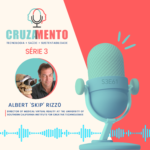In today’s CRUZAMENTO Podcast, André Correia e Daniel Guedelha talked with Albert ‘Skip’ Rizzo about how Virtual Reality (VR) can change education and mental health care, and its limitations and pitfalls.
Albert ‘Skip’ Rizzo is a clinical psychologist and Director of Medical Virtual Reality at the University of Southern California Institute for Creative Technologies. He is also a Research Professor with the USC Dept. of Psychiatry and at the USC Davis School of Gerontology.
His career began as a clinician providing rehabilitative services for persons with traumatic brain injuries and stroke.
Over the last 25 years, Skip has conducted research on the design, development and evaluation of Virtual Reality systems targeting the areas of clinical assessment, treatment and rehabilitation across the domains of psychological, cognitive and motor functioning in both healthy and clinical populations. This work has focused on PTSD, TBI, Autism, ADHD, Alzheimer’s disease, stroke and other clinical conditions. Some of his recent work has involved the creation of intelligent virtual human (VH) patients that novice clinicians can use to practice skills required for challenging diagnostic interviews.
He has also developed VHs for use as online/mobile virtual human healthcare guides and as clinical interviewers with automated sensing of facial, gestural, and vocal behaviors useful for inferring the state of the user interacting with these virtual human entities. In spite of the diversity of these clinical R&D areas, the common thread that drives all of his work with digital technologies involves the study of how interactive and immersive Virtual Reality simulations can be usefully applied to address human healthcare needs beyond what is possible with traditional 20th Century tools and methods.
To view some videos of this work, please visit this YouTube channel
Other relevant references | Outras referências relevantes:
Contacts | Contactos:
